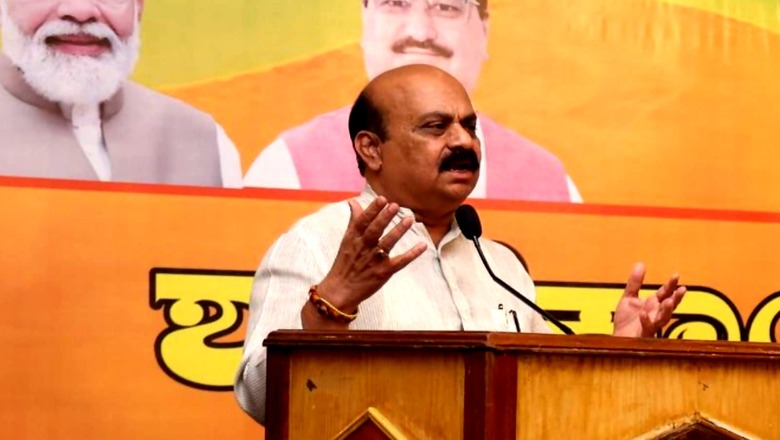
views
The Karnataka Legislative Council on Thursday passed the contentious “anti-conversion bill", amid objections from the opposition Congress and JD(S). The ‘Karnataka Protection of Right to Freedom of Religion Bill’ was passed by the Legislative Assembly last December.
As the bill was pending for passage in the Legislative Council, where the ruling Bharatiya Janata Party (BJP) was short of majority then, the government had subsequently promulgated an ordinance in May this year to give effect to the bill.
Home Minister Araga Jnanendra piloted the bill for the consideration of the Upper House on Thursday. Noting that in recent times religious conversions have become widespread, he said there have been mass conversions with allurements and through force, disturbing peace and leading to mistrust among people following different religions. The bill does not take away anyone’s religious freedom and that anyone can practice the religion of his or her choice, but not under pressure and allurements, Jnanendra said.
After the assent from the Governor, the law will come into effect from May 17, 2022, the date on which the ordinance was promulgated. Leader of Opposition in the Legislative Council B K Hariprasad even tore the copy of the bill in protest as the pro-tem Chairman Raghunath Rao Malkapure was in the process of putting the bill to vote. It is the 10th state in the country to pass such a law.
All you need to know about the bill that “aims to provide protection of right to freedom of religion and prohibition of unlawful conversion from one religion to another by misrepresentation, force, undue influence, coercion, allurement or by any fraudulent means".
- IT STATES: No person shall convert or attempt to convert, either directly or otherwise, any other person from one religion to another by use or practice of misrepresentation, force, undue influence, coercion, allurement or by any fraudulent means or by any of these means or by promise of marriage, nor shall any person abet or conspire such conversion. Provided that if any person reconverts to his immediate previous religion, the same shall not be deemed to be a conversion under this Act.
- WHO CAN FILE COMPLAINT? Any converted person, his parents, brother, sister or any other person who is related to him by blood, marriage or adoption or in any form associated or colleague may lodge a complaint of such conversion.
- PUNISHMENT: Whoever contravenes the provisions of section 3 shall, without prejudice to any civil liability, be punished with imprisonment for a term of three years, but which may extend to five years, and shall also be liable to fine of Rs 25,000.In case of a conversion involving a minor, a person of unsound mind, a woman or a person belonging to the Scheduled Caste or Scheduled Tribe, the accused shall be punished with imprisonment of either description for a term of three years, but which may extend to 10 years and shall also be liable to fine of Rs 50,000.In case of mass conversion, the imprisonment will be three years, but may extend to 10 years, and a fine of Rs 1 lakh.In case of a repeat offender, the accused shall be punished with imprisonment of either description for a term of not less than five years and shall also be liable to a fine of Rs 2 lakh.
- COMPENSATION: The court shall also grant appropriate compensation payable by the accused to the victim of said conversion which may extend to maximum of Rs 5 lakh and shall be in addition to the fine.
- NULL AND VOID: Any marriage which has happened with sole purpose of unlawful conversion or vice-versa by the man of one religion with the woman of another religion, either by converting himself before or after marriage or by converting the woman before or after marriage, shall be declared as null and void.
- NON-BAILABLE AND COGNIZABLE: Notwithstanding anything contained in the Code of Criminal Procedure, 1973 (Central Act 2 of 1974), every offence committed under this Act shall be cognizable and non-bailable.
- DECLARATION BEFORE CONVERSION: One who desires to convert his religion, shall give a declaration in Form-I at least 30 days in advance to the District Magistrate or the Additional District Magistrate specially authorized by the District Magistrate of his residing district or place of birth within the state.The religious converter who performs the ceremony shall give 30 days advance notice in Form-II of such intended conversion, to the District Magistrate or the Additional District Magistrate.The District Magistrate shall notify it on the notice board of the office of the District Magistrate and in the office of the Tahsildar calling for objections. If any objections are received within 30 days, he shall get an inquiry conducted through officials of Revenue or Social Welfare Department with regard to genuine intention, purpose and cause of the proposed conversion.If the District Magistrate comes to a conclusion of an offence under this Act, he shall cause the concerned police authorities to initiate criminal action for contravention of the provisions of section 3. Any conversion in contravention of sub-section (1) or sub-section (2) is illegal and void.If no objections are received for such conversion, the District Magistrate shall record the factum of declaration and confirmation in a register maintained for this purpose. Further District Magistrate shall issue an official notification and shall simultaneously intimate the concerned authority about such conversion.
- DECLARATION POST CONVERSION: The converted person shall send a declaration in the Form-III within thirty days of the date of conversion, to the District Magistrate of the District or the Additional District Magistrate specially authorized by the District Magistrate in this regard in which he is residing prior to the date of conversion. The District Magistrate shall notify religious conversion on the notice board of the office of the District Magistrate and in the office of the Tahsildar and will call for objections in such cases where no objections were called earlier under section 8.The converted person shall appear before the District Magistrate within 21 days from the date of sending/filing the declaration to establish his identity and confirm the contents of the declaration. If any objections are received within 30 days, the District Magistrate shall record the name and particulars of objectors and the nature of objection and shall get an inquiry conducted through officials of Revenue or Social Welfare Department with regard to genuine intention, purpose and cause of the conversion.If the District Magistrate based on the said inquiry comes to a conclusion of the commission of an offence under this Act, he shall cause the police authorities concerned to initiate criminal action for contravention of the provisions of section 3.The contravention of the provisions of sub-sections (1) to (4) shall have the effect of rendering the said conversion illegal and void. If no objections are received for such conversion, the District Magistrate shall record the factum of declaration and confirmation in a register maintained for this purpose.
- INSTITUTIONS: If any institution violates the provisions of this Act, the person or persons in charge of the affairs of the institution, shall be liable to punishment as provided under section 5. The State Government shall not provide any financial aid or grant to such institution violating the provisions of this Act.
- BURDEN OF PROOF: The burden of proof as to whether a religious conversion was not effected through misrepresentation, force, undue influence, coercion, allurement or by any fraudulent means or by marriage, lies on the person who has caused the conversion and on the abettor who aids or abets such conversion.The State Government may by notification in the official Gazette, add, alter or omit any of the entries specified in the Form. The State Government may make rules by notification, to carry out the purposes of this Act.
With Agency Inputs
Read all the Latest Politics News and Breaking News here




















Comments
0 comment